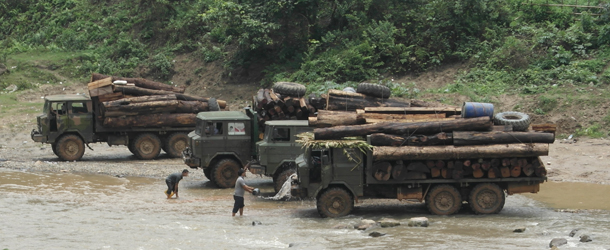RANGOON — The Burmese government took a hard line on the timber trade in Kachin State on Tuesday, as state-run media publicly denounced rebels for facilitating illicit cross-border transfers.
The military-owned Myawaddy daily newspaper reported that 122 people—102 of them foreigners believed to be Chinese—were arrested in Kachin State’s Wai Maw Township from Jan. 2-4, carrying documents indicating that the Kachin Independence Army (KIA) had authorized timber transport.
A nationwide ban on raw timber exports went into effect on April 1, 2014, though logging has long been a major source of revenue for the KIA and its political wing, the Kachin Independence Organization (KIO), which has been at odds with the government for decades over political autonomy and the right to resources.
A liaison officer for the KIO, Dau Kha, told The Irrawaddy on Tuesday that the authenticity of the document—which the government said identified a high-ranking KIA officer as complicit in illegal trade—could not be confirmed.
“I have not seen that letter, so I couldn’t tell because there are many letters issued by the KIO business department regarding permissions for timber trucks to cross our territories,” said Dau Kha, explaining that the logging industry is complicated and involves approval from several authorities including the government, government-backed militias and KIA officers.
Logs extracted in Sagaing, he said, are often cut under the authority of the government but are ultimately shipped through KIO-controlled areas, where they are taxed. Dau Kha said that there is no active logging in the Wai Maw area because most of the woods were felled by the government during a ceasefire period that lasted until June-2011, but trees cut in central Burma often pass the route en route to China. All of those exports are now illegal, as the ban limits trade to government-approved shipments of processed woods out of Rangoon ports.
While not denying that illicit trade continues, the KIA perceived both the ban and the recent crackdown as a tactic used by the government to cut off revenues and supplies to ethnic armed groups. Rapid enforcement of new national policies in ethnic areas has often served as pretense for clashes between rebel and government troops.
No conflict has yet been reported in Kachin State since the year began, but tensions remain high after the Burma Army launched multiple rounds of artillery onto a KIA academy near the rebel headquarters in Laiza in late November, 2014. The attack, which the government said was “unintentional,” left 23 cadets from various ethnic armed groups dead.
The incident brought an ongoing peace process to a near standstill as government and ethnic negotiators tried in vain to reach a nationwide peace accord by the end of the year. The goal has since been pushed back to Union Day, on Feb. 12. The KIA is one of only two major ethnic armed groups yet to reach a bilateral peace agreement with the government.
On Sunday, the KIA turned down an invitation to attend a military parade in Burma’s capital city of Naypyidaw honoring the country’s independence from Britain. Dau Kha said that aggression from the Burma Army in Kachin and Shan states is damaging to the peace process.
“Peace cannot be built by force and military strategy,” he said.

















